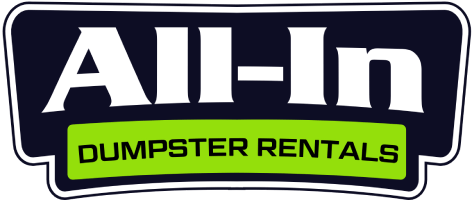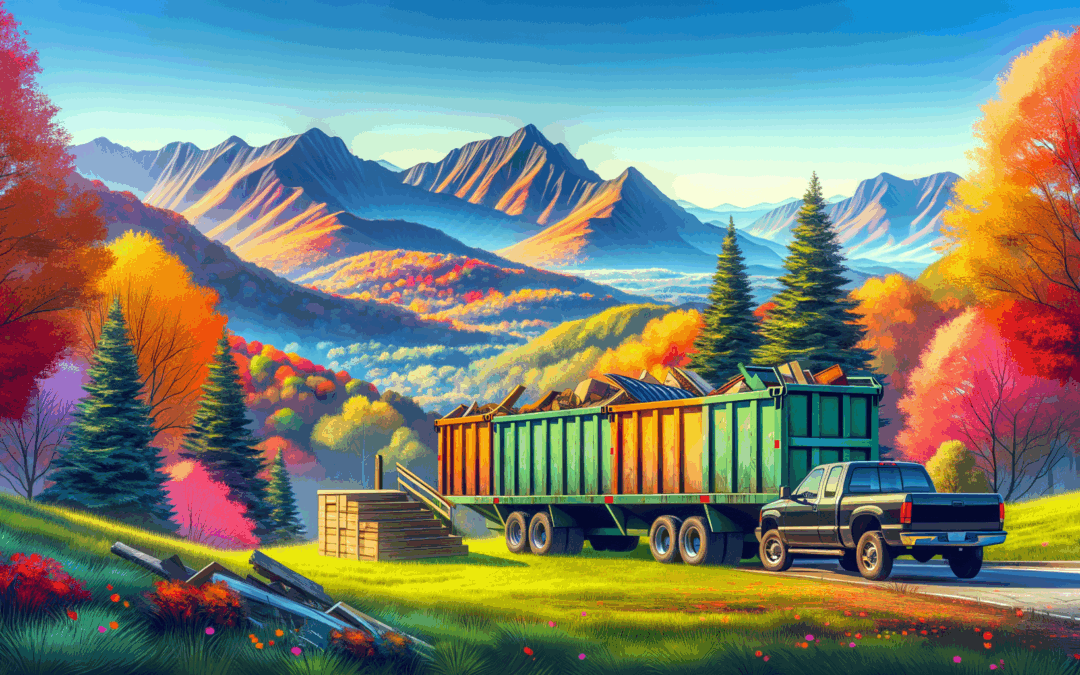Fall is finally here in Western North Carolina, and that means many Asheville homeowners are tackling those big yard cleanup and landscaping projects before winter sets in. Whether you’re clearing overgrown brush, removing storm debris, or reimagining your outdoor space, these projects create a surprising amount of yard waste that can quickly overwhelm your regular trash service.
Here in the mountains of Asheville, landscaping presents unique challenges you won’t find in other parts of the country. Our combination of rocky terrain, steep lots, and fast-growing native vegetation creates situations where having the right waste removal solution isn’t just convenient—it’s essential. As a local, family-owned waste management company serving Buncombe, Henderson, Haywood, and Madison counties, we’ve helped countless neighbors turn potential yard waste nightmares into smoothly managed projects.
Let’s explore how to choose the perfect dumpster for your specific landscaping needs, with special attention to the unique aspects of yard work in our mountain community.
Understanding Different Types of Yard Waste
Before selecting a dumpster, it’s important to understand what type of yard waste you’re dealing with. In Western North Carolina, yard waste typically falls into several categories:
Organic yard waste: This includes grass clippings, leaves, small branches, and plant trimmings. The Asheville area’s lush environment means this type of waste accumulates quickly, especially during fall when our beautiful deciduous trees shed their foliage.
Heavy woody debris: Larger branches, tree trunks, and stumps are common when clearing property or after storms roll through our mountain valleys. These materials are heavier and require specific disposal considerations.
Mixed landscaping waste: This category includes soil, rocks, gravel, and other non-organic materials often generated during garden renovations or hardscaping projects. Our mountain soil often contains more rocks than soil in some areas, creating significant disposal challenges.
Invasive plant species: Removing invasives like kudzu, Japanese knotweed, or English ivy requires proper disposal to prevent spread. These aggressive plants thrive in our climate and require careful handling.
Selecting the Right Dumpster Size for Your Yard Project
At All-In Dumpster Rentals, we offer several sizes perfectly suited for different landscaping projects around Asheville:
10-Yard Dumpsters: Ideal for smaller yard cleanups and garden renovations. These compact dumpsters work well for Asheville’s narrow mountain roads and tight driveways where space is limited. They’re perfect for projects like clearing a small garden bed or removing a modest amount of brush.
13-Yard Dumpsters: Our mid-size option strikes the perfect balance for medium landscaping projects. If you’re redoing a larger section of your yard or clearing moderate brush, this size provides extra capacity without overwhelming your property.
15-Yard Dumpsters: Best for major yard overhauls, clearing large amounts of brush, or whole property cleanups. These larger dumpsters are particularly useful for those extensive projects common in our rural mountain properties where years of growth may need clearing.
When deciding which size is right for your project, consider not just the volume but also the weight of your yard waste. Mountain landscaping often involves heavier materials than expected due to our rocky soil composition.
Special Considerations for Asheville Yard Waste
Landscaping in Western North Carolina comes with unique considerations you won’t find in other regions:
Steep terrain logistics: Many Asheville properties feature challenging slopes that make waste removal difficult. We’re experienced with these mountain property challenges and can help determine dumpster placement that works with your terrain.
Seasonal factors: Fall in WNC brings massive leaf drop, while spring often reveals winter storm damage. Planning your project timing and dumpster needs with these seasonal factors in mind helps ensure a smoother process.
Local regulations: Different counties across WNC have varying rules about yard waste disposal. For example, Buncombe County has specific guidelines about separating yard waste from other materials. We’re familiar with local requirements across our service area and can help you stay compliant.
Environmental considerations: Our mountain ecosystem is precious, and proper disposal of yard waste helps protect it. Invasive species, in particular, need careful handling to prevent spread through our watersheds and forests.
Loading Tips for Yard Waste in Your Rental Dumpster
Once you’ve selected the right dumpster, how you load it makes a big difference in maximizing space and avoiding extra charges:
Start with the bulky items: Place larger branches, stumps, and woody materials at the bottom of the dumpster. This creates a solid base and prevents these awkward items from wasting space later.
Break down larger branches: Cut branches into smaller sections when possible. This allows for more efficient packing and prevents “air space” from taking up valuable dumpster capacity.
Layer your materials: Alternate between heavier and lighter materials. For example, layer dense soil with lighter brush or leaves. This helps distribute weight evenly and maximizes your available space.
Watch your weight: Yard waste—especially soil, rocks, and stumps—can be surprisingly heavy. Be mindful of weight limits, as exceeding them can result in additional charges. If you’re dealing with particularly heavy materials from your mountain property, let us know so we can help you plan accordingly.
Consider moisture content: Wet leaves and green vegetation weigh significantly more than dry materials. If possible, allow fresh-cut vegetation to dry for a day or two before loading it into your dumpster.
What NOT to Put in Your Yard Waste Dumpster
While our dumpsters are versatile, certain items shouldn’t be mixed with your yard waste:
Hazardous materials: Never dispose of pesticides, fertilizers, gas-powered equipment, or chemicals in your dumpster. These require special handling and disposal methods.
Treated lumber: Wood that has been pressure-treated, painted, or stained should be separated from natural yard waste as it contains chemicals that require different disposal methods.
Large quantities of dirt: While some soil is acceptable, dumpsters filled primarily with dirt quickly exceed weight limits. For major excavation projects, specialized dirt removal services may be more appropriate.
Household trash: Keep regular household waste separate from your yard debris. Mixing trash with yard waste can create disposal problems and potentially lead to additional fees.
Making the Most of Your Yard Waste
Before filling that dumpster, consider whether some of your yard waste could be put to better use:
Composting: Many Asheville residents maintain compost piles that turn leaves, grass clippings, and plant matter into valuable garden nutrients. Our mountain soil often needs organic enrichment, making compost particularly valuable.
Mulching: Chipped branches and leaves make excellent mulch for garden beds, helping retain moisture in our occasionally drought-prone summers while suppressing weeds.
Brush piles: If your property allows, consider creating wildlife habitat by establishing a brush pile in a remote corner. These provide valuable shelter for birds and small mammals that contribute to our region’s biodiversity.
Community resources: Some materials may be accepted at local community composting programs. Check with Buncombe County or your local municipality for green waste programs that might help reduce what goes into your dumpster.
Timing Your Dumpster Rental for Seasonal Yard Projects
In Western North Carolina, smart timing can make your landscaping project much more manageable:
Fall cleanup: Late October through November is peak leaf-falling season in the Asheville area. Scheduling your dumpster rental during this window allows you to complete your cleanup in one efficient effort rather than dealing with multiple smaller cleanups.
Spring rejuvenation: March through May is ideal for major yard overhauls after winter has passed. This timing allows you to clear winter debris and prepare new plantings before the growing season kicks into high gear.
Post-storm cleanup: Our mountain weather can be unpredictable, with summer thunderstorms and winter ice events creating sudden yard waste. We offer flexible scheduling to help with unexpected cleanup needs.
Weekend project planning: For those big weekend landscaping pushes, consider scheduling your dumpster delivery for Friday morning. This gives you a full weekend to complete your project without rushing.
Real Examples from Around Asheville
Let me share a couple of real situations we’ve helped with in our community:
A homeowner in North Asheville needed to clear years of overgrown brush on a steeply sloped backyard. The combination of invasive vines, fallen branches, and accumulated leaves created a massive cleanup challenge. We helped position a 15-yard dumpster in the driveway where wheelbarrows could easily access it from various points on the property. The project transformed an unusable space into a beautiful native garden that now showcases mountain views.
Another customer in Henderson County was dealing with storm damage after a severe summer thunderstorm took down several large tree branches. With a 10-yard dumpster delivered same-day, they were able to clear the debris quickly and prevent further property damage. The prompt service meant they didn’t have unsightly brush piles lingering while waiting for regular yard waste pickup.
Environmental Benefits of Proper Yard Waste Disposal
When you choose professional yard waste removal in Western North Carolina, you’re helping protect our beautiful mountain environment:
Preventing illegal dumping: Unfortunately, some people resort to dumping yard waste in ravines or vacant lots when proper disposal seems inconvenient. This can spread invasive species and create erosion problems on our mountainsides.
Reducing fire hazards: Proper removal of dry brush and yard debris reduces wildfire fuel around your home—an increasingly important consideration as our region faces occasional drought conditions.
Supporting proper processing: When yard waste goes through proper channels, it can be turned into mulch or compost rather than taking up landfill space.
Protecting watersheds: Our mountain region is the headwaters for important river systems. Preventing yard waste from entering streams and drainage areas helps protect water quality downstream.
Planning Your Next Landscaping Project
Ready to tackle that yard project you’ve been putting off? Here’s how to make the process smooth from start to finish:
First, assess your project scope and estimate the amount of waste you’ll generate. Taking measurements or photos of the area can help us recommend the right dumpster size for your specific needs.
Consider access points on your property. Mountain driveways can be challenging, but our local experience means we can usually find solutions even for difficult placements.
Schedule your rental with enough buffer time. While we offer same-day service when available, booking a few days ahead ensures you get the exact timing that works for your project, especially during busy seasons like spring and fall.
Remember that as a local, family-owned business serving Western North Carolina, we understand the unique challenges of mountain properties and seasonal yard maintenance. We’re your neighbors, and we’re committed to helping keep our community beautiful one dumpster at a time.
When your yard project is complete and your outdoor space is transformed, you’ll be glad you chose the right disposal solution from the start. From small garden renovations to major property clearing, having the appropriate dumpster makes all the difference in creating a stress-free landscaping experience in our beautiful mountain home.

